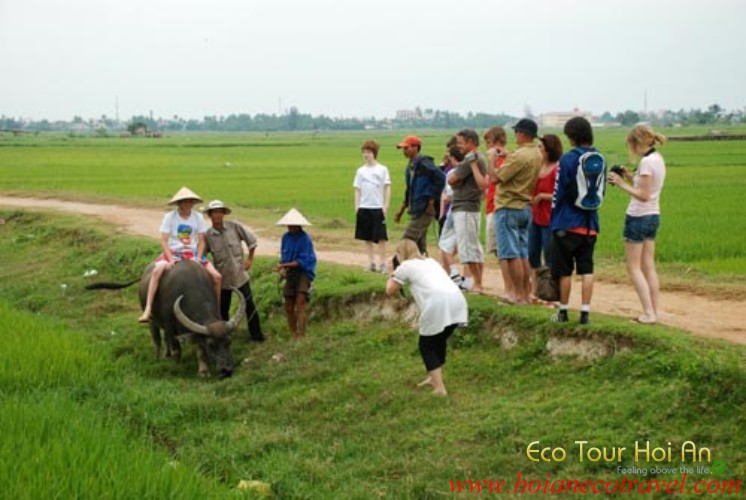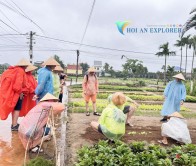Hoi An Eco Tourism
Hoi An activity: Back home in California you can’t swing a cat without whacking 100 things that are: locally produced, organic, eco-friendly, sustainable, carbon neutral, and/or fair-trade.
It should come as no big surprise in a country where more Vietnamese friends have iPhones than at home and in a town catering to visitors’ tastes and preferences that the trend of ‘Sustainable Tourism’ (a sub-set of Sustainable Development) is catching on here too.
I see more and more people walking around Hoi An with re-usable shopping bags, and local businesses touting their eco-friendly, socially just products and services. Labels like, ‘Sustainable’, ‘Responsible’, ‘Eco’, ‘Green’, ‘Locally Sourced’, ‘Organic’ and ‘Fair Trade’ are growing like the mould on my pillows during the wet season.
So what do these labels mean in the context of your holiday? If you’re into trying to make purchasing decisions that minimize your impact on the environment, improves people’s economic and social situation – how do you do this while trying to enjoy your La Rue at the beach? Or – in the rainy season – at Al Fresco’s watching a game?
As I’ve spent a lot of time pondering these questions allow me to share my own neurotic musings on the topic (before you go crazy trying to figure out whether the dye in that silk Ao Dai you just had made is eco tour-friendly).
First, to set the stage, although it’s not in the ‘real Vietnamese culture’ itineraries of travel agencies and doesn’t include native costumes or bamboo musical instruments, checking out how people live their lives today is a fascinating way to experience the ‘real Vietnam’ (aince 70% of the population of nearly 90 million are under the age of 35 – this means checking out what web/iPhone savvy flashy motorbike riding youngsters are into).
Although it’s not as personally satisfying as buying a handmade pillow case from a youngster who has learned how to do embroidery, taught herself English and gets around in a wheelchair buying carbon offsets from a reputable company for your international flight is probably the biggest thing you can do for the environment. It’s pretty cheap and doesn’t cost much and is offered by many airlines at checkout.
Next, in the spirit of experiencing another culture try and live closer to the way folks do here. Ride a bike more, use a fan instead of a/c more, eat less meat (and lots of vegetables), and buy stuff your neighbours sell.
Save your money to build a house for your family or send your kids to school. In some sense if you go a little local you don’t need all these labels to steer you in the right direction. Although income levels are still much lower than at home, most people have retained frugal, scarcity-based attitudes towards using resources.
If you’re poor you don’t have to reinvent your life to be ‘green’. When you own three shirts, live in a two bedroom home with three generations of family members and buy your vegetables daily in the local market, you don’t have to use a carbon footprint calculator to know you’re ok in terms of a sustainable lifestyle.
Still, that being said, there are lots of reasons to support young businesses here that are trying to do more than just make money. In an ideal world, Vietnam will be able to leapfrog some of our resource-intensive practices and use more sustainable practices.
Meanwhile, back in the real world, during your holiday, it can bring added meaning to your visit to patronize businesses that are trying to go beyond providing a service and do something more for the environment or folks who would otherwise be marginalized.
Many use the trendy labels – Fair Trade, Eco etc. to describe their services. Most can’t afford international certifications which are not meant for small businesses without access to international donor funds, so don’t be put off by those who don’t have an international certificate.
My advice is to use good sense when selecting vendors, ask specific questions about what they actually do and how much of your money goes to the projects or people they say they’re helping. It’s probably not perfect yet – but it’s a good place to start.
If you feel like you can trust the organization, consider making a donation to the cause. Some of the organizations that are trying to do a little more are listed in Eco Tour Hoi An’s ‘Recommended Associations and Businesses List’ in the Community Section./.





